Palestinian Authority Ministry of Information tracks PMW releases to protect Fatah's Facebook page from closure
PA Ministry of Information tracks PMW releases
to protect Fatah's Facebook page from closure
- Chief editor of Fatah's Facebook: "Whenever [PMW] reports one of our posts, the [PA] Information Ministry informs me and then I immediately delete it...I do that to protect the page because if they issue enough complaints, Facebook could close it."
- "[PMW Director Itamar] Marcus confirmed that he has noticed the page has recently started to delete posts shortly after PMW publishes reports on them."
By Nan Jacques Zilberdik
The chief editor of Fatah's official Facebook page, Munir Al-Jaghoub, has dismissed Palestinian Media Watch's reports documenting that the page glorifies terrorists and promotes violence. Al-Jaghoub justified the posts promoting violence as being mere "symbolism," and the posts taking pride in Fatah's murder of 11,000 Israelis as "only a statistic." [The Times of Israel, Feb. 15, 2019]
The chief editor of the page revealed that PMW's reports are tracked as high up in the PA as the PA Ministry of Information. The ministry alerts Al-Jaghoub whenever PMW reports on a problematic post, and the editor then removes it. This is a strategy to protect the page from being shut down by Facebook. Acting as its warning bell, the PA Ministry of Information also indirectly endorses Fatah's official Facebook page:
"[Chief editor of Fatah's Facebook page Munir Al-]Jaghoub said he recently implemented a new strategy to preempt complaints. 'Whenever [PMW] reports one of our posts, the [PA] Information Ministry informs me and then I immediately delete it,' he said. 'I do that to protect the page because if they issue enough complaints, Facebook could close it.'"
[The Times of Israel, Feb. 15, 2019]
Al-Jaghoub also said that Fatah's page has received three warnings from Facebook, and that he fears Facebook might close the page.
Over the years, Abbas' Fatah Movement has posted numerous posts on its official Facebook page glorifying terrorists and promoting violence, as documented by PMW - most recently in a report documenting such Fatah posts from 2018, which shows that Fatah uses its Facebook page not only to glorify terror of the past but also to praise the most recent attacks and terrorists who murdered Israeli civilians in 2018.
The following is the article and interview with the chief editor of Fatah's official Facebook page in The Times of Israel:
Denying incitement, Fatah Facebook page chief claims incendiary posts 'symbolic'
Israeli critics dismiss Munir al-Jaghoub's arguments as 'ludicrous'; Fatah officials suggest page does not reflect party's official positions
By Adam Rasgon | Feb. 15, 2019
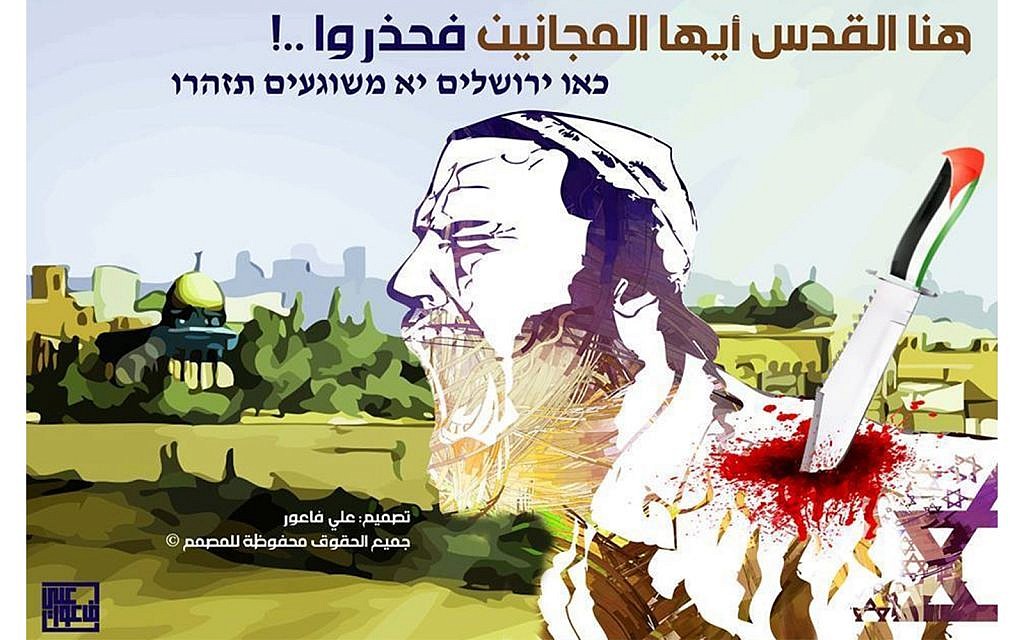
A post on "The Palestinian National Liberation Movement 'Fatah'/ The Official Page"
from October 2015 of a knife stabbing a religious Jew. (Palestinian Media Watch)
from October 2015 of a knife stabbing a religious Jew. (Palestinian Media Watch)
RAMALLAH, West Bank - A knife with a Palestinian flag on its handle stabbing a religious Jew. Praise for a Palestinian terrorist partially responsible for the deaths of 38 Israelis, including children. A claim that Palestinian Authority President Mahmoud Abbas's Fatah party has killed thousands of Israelis. These are among the incendiary posts in recent years on a Facebook page connected to the PA leader's Fatah faction.
The Israeli government and independent watchdogs have regularly denounced the Facebook page, called "The Palestinian National Liberation Movement 'Fatah'/ The Official Page," and international news outlets, including the New York Times and CNN, have critically covered some of its posts.
In a recent hour-long interview, the page's chief editor Munir al-Jaghoub talked to The Times of Israel about its inner workings and its most controversial posts. In his northern Ramallah office decorated with a collection of photos of the late Palestinian leader Yasser Arafat, Jaghoub deflected criticism of the page and contended that its opponents have misinterpreted its content.
Jaghoub, who is also the spokesman of Fatah's Mobilization and Organization Commission (the party body that oversees local branches, activities and recruitment) and previously worked for the PA, claimed critics of the page misunderstand what he called the "symbolism" of some of its most controversial posts. He also contended it has never overtly incited violence.
Still, Jaghoub admitted that sometimes higher-ups in Fatah have requested that he take down posts they found too contentious. Meanwhile, three high-ranking Fatah party officials indicated to The Times of Israel that the page does not reflect their faction's official positions.
Israeli critics derided Jaghoub's claims about "the symbolism" of the page's posts, arguing it has "consistently" incited Palestinians to carry out violent attacks against Jews.
'Metaphor' dripping with blood
Welcomed to the office and offered sage tea, this reporter first asked Jaghoub about the page's history and background, and then got down to brass tacks, showing the Fatah official screenshots of four of its most controversial posts. Jaghoub wasn't rattled.
"That photo is symbolic," he said calmly, shown a screenshot of an October 2015 cartoon depicting a blood-spattered knife with a Palestinian flag on its handle stabbing a religious Jew in the back near the Temple Mount, also known as the Al-Aqsa Compound, with the text "Be careful, you crazies. Here is Jerusalem."
The cartoon was posted at the start of a persistent wave of Palestinian stabbing, ramming and shooting attacks against Israelis in late 2015 and early 2016. But Jaghoub rejected the idea that the image blatantly encouraged violence.
"It is showing the Palestinian flag stabbing settlements," he claimed. "The goal of the photo is not to encourage stabbings but rather to express our rejection of settlements, which the settler in it represents."
It was obvious that the man in the image is a settler, Jaghoub said, since "he is standing beside the Al-Aqsa Mosque in East Jerusalem. I think that makes it clear." (The Ramallah-based Palestinian leadership claims East Jerusalem as its captial and considers Jewish residents of East Jerusalem to be settlers. Israel has annexed East Jerusalem in a move not accepted by the international community.)
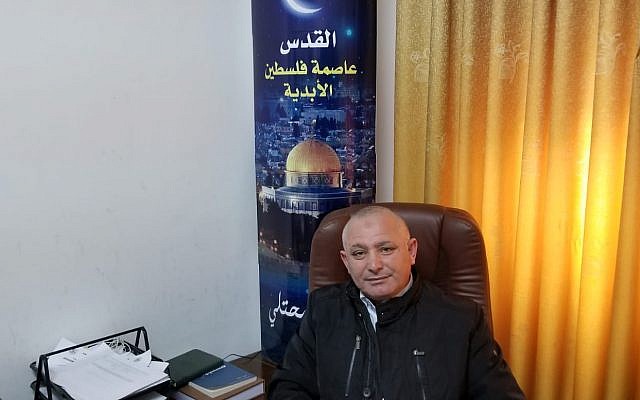
Munir Jaghoub, the chief editor of
"The Palestinian National Liberation Movement 'Fatah'/ The Official Page,"
"The Palestinian National Liberation Movement 'Fatah'/ The Official Page,"
in his northern Ramallah office on January 22, 2019. (Adam Rasgon/Times of Israel)
Critics of the page contacted by The Times of Israel, by contrast, dismissed Jaghoub's argument, and an Israeli government official said flatly that he was lying.
"How does he know a young Palestinian teenager will see the post as a metaphor?" asked Itamar Marcus, the head of Palestinian Media Watch (PMW), an Israeli non-governmental organization that frequently reports on controversial posts from the page.
"Even if I theoretically take him at his word - which I don't - that the post is a metaphor, I don't think we can assume young Palestinians will see it that way," said Marcus. "What he said is a total distortion of reality. The posts on this page have consistently incited young Palestinians to violently attack and kill Jews."
PMW has a section on its website dedicated to PA and Fatah social media, and it features well over 100 reports on contentious posts from the page dating back to 2012. Marcus said PMW has sent many of its reports to the Prime Minister's Office and US government officials.
Other watchdog groups and think tanks, including the Middle East Media Research Institute and the Jerusalem Center for Public Affairs, have also written reports about incendiary posts on the page.
Ofir Gendelman, Prime Minister Benjamin Netanyahu's Arabic-language spokesman, contended that Jaghoub's explanation of the knife image was dishonest.
"He's lying through his teeth," said Gendelman, who has engaged Jaghoub in arguments on Twitter. "He knows that the post is not symbolic. What he said is nothing short of deception."
A hefty following
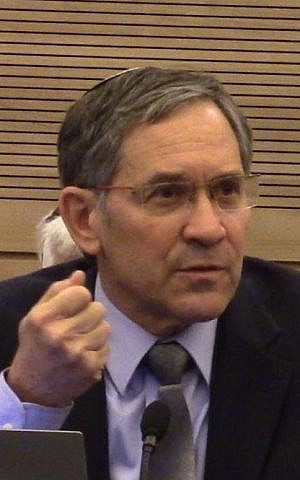 | |
Itamar Marcus, the director and founder of Palestinian Media Watch, an Israeli non-governmental organization that frequently publishes reports on Fatah social media, speaking in the Knesset. (Courtesy Itamar Marcus) |
Tens of thousands of Facebook users visit the page every month - 68,400 in December, according to analytics provided to The Times of Israel.
Jaghoub, a native of Baita, a village south of Nablus, and a former leader of Fatah's youth movement, said he, a graphic designer and 12 volunteers from across the West Bank and the Middle East, edit and maintain the page and use a $500 monthly budget to sponsor posts so that more people see them. He said he creates many of the posts himself.
Jaghoub also pushed back on criticism of a post from August 2016 that claimed Fatah has killed 11,000 Israelis.
"That is only a statistic and nothing else," he said, when asked if the post was boasting about killing Israelis. "I also would like to say that when Fatah did that [killing], we were engaged in an armed struggle. Today, the situation has changed; our way is one of popular resistance against the occupation."
The August 2016 post reads: "To the argumentative... the ignorant... and those who do not know history... the Fatah movement has killed 11,000 Israelis."
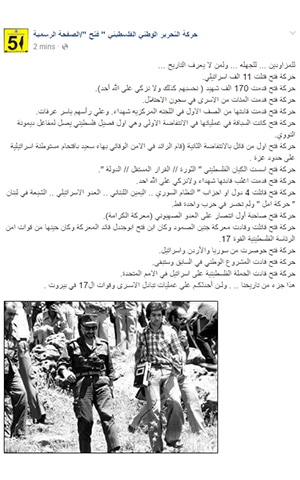 | |
| A post on "The Palestinian National Liberation Movement 'Fatah'/ The Official Page" that claims the party has killed 11,000 Israelis. "To the argumentative...the ignorant...and those who do not know history...The Fatah movement has killed 11,000 Israelis," the post reads. (Palestinian Media Watch) |
While Fatah won a large percentage of the seats on local councils in the West Bank, it did not fare well in a number of major cities and villages.
Asked why the page would put up such a post, if Fatah now supports peaceful protest of Israel's military rule, he responded, "We are still proud of our history."
Marcus of the Palestinian Media Watch group had a biting response to this.
"His claim that Fatah's celebrating the killings of 11,000 Israelis was mere 'statistics' is ludicrous," Marcus said, noting that the Facebook page also recently referred to a Palestinian who shot dead two Israelis in a West Bank industrial zone as "a legend."
The New York Times also criticized the post in a news article it published in August 2016, "Fatah Makes Incendiary Facebook Claim of Killing 11,000 Israelis."
Whose page is it?
While Jaghoub said every post on the page "undoubtedly" represents the official positions of Fatah, and it is called "The Official Page," other officials in the party disagreed.
Fatah spokesman Osama Qawasma said the page represents only the Fatah Mobilization and Organization Commission.
"The page belongs to the Mobilization and Organization Commission and represents its positions," Qawasma said. "The Media Commission expresses Fatah's official political positions," he added, referring to the Fatah body he works for that frequently puts out statements on developments related to Israel and the Palestinians.
Qawasma declined to answer further questions, including on why the Fatah leadership has not ordered the page closed.
Fatah has some 11 commissions, headed by various Fatah Central Committee members.
Another high-ranking Fatah official, who asked to remain nameless, said the page "definitely does not represent Fatah's official positions," labeling Jaghoub and his editors "a group of amateurs."
Senior Fatah official Azzam al-Ahmad said he knew nothing about the page. "I swear to God I have never seen or heard about that page," Ahmad said in an interview in al-Bireh, a town adjacent to Ramallah.
Husam Zomlot, the head of the PLO mission to the UK who until recently served as the top Palestinian diplomat in Washington, DC, also sought to distance the Ramallah-based Palestinian leadership from the page, the New York Times reported in its August 2016 story. It was probably the work of "some hot-blooded youths," Zomlot said at the time.
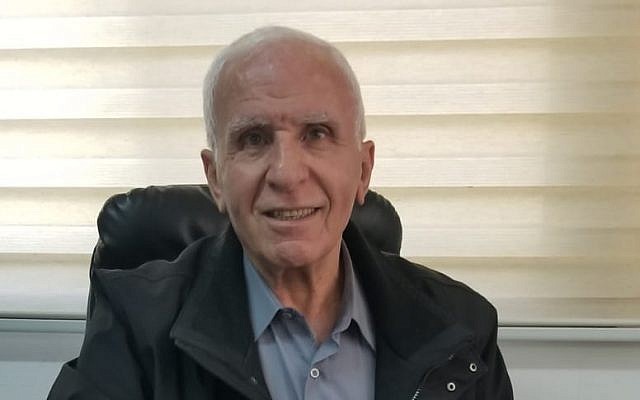 | |
| Azzam al-Ahmad, a senior Palestinian official, in his office in northern Ramallah on December 4, 2018 (Adam Rasgon/Times of Israel) |
"There have been times when higher authorities in the movement have called me and asked me to remove posts because they harm the supreme national interests of the Palestinian Authority," he said. "In those instances, I immediately removed the posts."
He declined to share examples of posts Fatah officials have asked him to erase. He also refused to reveal the names of those officials.
Mahmoud al-Aloul, Fatah's vice chairman who previously was the head of the Mobilization and Organization Commission, told CNN in January 2015 that the page was asked to remove a post from the previous month that featured a gun and Fatah flag on top of a pile of skulls with Stars of David on them, alongside the text "Lingering on your skulls."
Facebook took down the page in the wake of that post.
"The image and the text do not reflect the opinions of Fatah," Aloul said to CNN, which reported that the post was later removed.
Two other top Fatah officials declined to be interviewed for this article.
Cat-and-mouse posting
Jaghoub said Facebook has sent him and his volunteers three warnings regarding posts on his page.
"I'm concerned Facebook will delete the page at any moment," he said. "Israel has an entire electronic army of people making complaints about the page every day."
Marcus said PMW does not make complaints to Facebook about individual posts on the page, but said it submitted a long report to the company just days ago.
After having shut down the page entirely in 2015, the social media site suspended the current iteration of the page in 2017 - according to Jaghoub, over a photo of Yasser Arafat holding a Kalashnikov - then reinstated it.
Jaghoub said one of the recent warnings Facebook sent him and his volunteers came after the page put up an image of Yahya Ayyash, who was the chief bomb-maker of the Hamas terror group and a top leader in its military wing. Israel assassinated Ayyash in 1996 by remotely detonating a cellphone he was using.
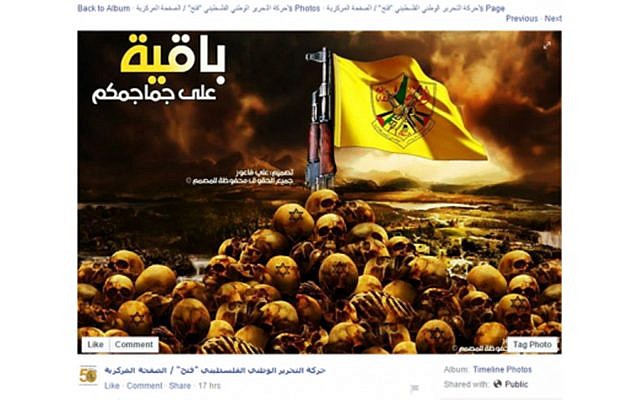
A January 2015 post on "The Palestinian National Liberation Movement 'Fatah'/ The Official Page"
of a gun and the party's flag on top of a pile of skulls with Stars of David on them.
of a gun and the party's flag on top of a pile of skulls with Stars of David on them.
The text reads "Lingering on your skulls." (Screenshot: Facebook)
Jaghoub said he recently implemented a new strategy to preempt complaints.
"Whenever [PMW] reports one of our posts, the [PA] Information Ministry informs me and then I immediately delete it," he said. "I do that to protect the page because if they issue enough complaints, Facebook could close it."
Marcus confirmed that he has noticed the page has recently started to delete posts shortly after PMW publishes reports on them.
Jaghoub said he also recently instructed his volunteer editors to sometimes avoid putting photos in posts, a practice which he believes has previously drawn complaints.
"For example, in the past when we posted that rockets have been fired from Gaza, we would add a photo of rockets. The Israeli electronic army would then make complaints about the picture and Facebook would temporarily suspend our account," he said. "Now we sometimes just post the text without a photo."
Facebook did not respond to multiple questions posed to it for this report.
Tripartite committee on incitement
Ahmad, the senior Fatah official, said the Palestinians would be prepared to discuss issues such as the posts on the page within the framework of a long-dormant tripartite American-Israeli-Palestinian committee on incitement.
"We can reconvene the committee to deal with these issues," he said. "Israel would have the right to raise what it wants with the committee and we would have the right to raise what we want with it."
The committee on incitement was created as a part of the Wye River Memorandum, an agreement between Israel and the Palestine Liberation Organization that was signed in 1998. While it met several times in the late 1990s, it has not convened since mid-1999.
In the past several years, Abbas has repeatedly called for the committee's revival, including at meetings in Ramallah with former and current Israeli lawmakers.
Gendelman, Netanyahu's spokesman, indicated that Israel would not be interested in reviving the committee.
"When the committee met in the 1990s the Palestinians always promised they would do something about incitement, but the fact of the matter is that they never did," he said. "This call to resumption of the committee is a tactic to deflect criticism. What they need to do is very simple - they need to stop inciting to murder Israelis."
Back at his Ramallah office, Jaghoub took out his phone and pulled up a caricature he said he would soon post on the Facebook page showing a shackled hand holding up a torch while connected to a large black weight with a Star of David on it.
"Just watch," he said. "In a couple of hours, the Israelis will go crazy over this post. The whole point of it is to show how our prisoners are remaining steadfast in the face of the occupation's persecution... But they don't see things they way we do. So I won't be surprised if they start making complaints about it."
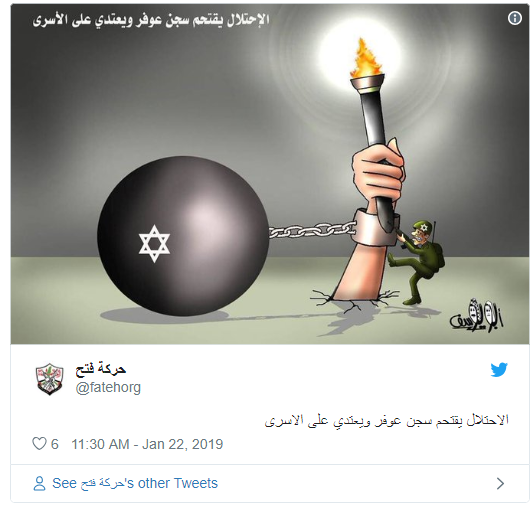
Jaghoub ultimately did not upload the post to the page, but he did post it on one of Fatah's Twitter accounts, which he also runs.
Marcus said his organization would not report a general expression of support for Palestinian prisoners.
"There is an attempt on the part of Fatah to say we are complaining about petty things," Marcus said. "This post is not problematic and we would not make a news bulletin about it."
AP contributed to this article.